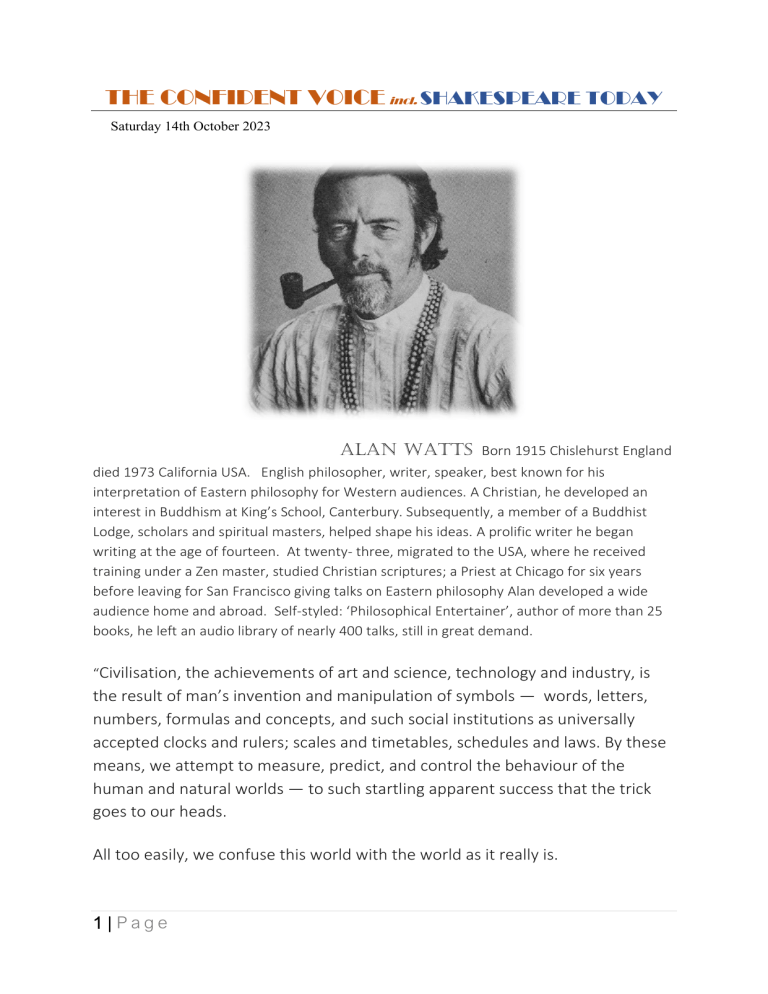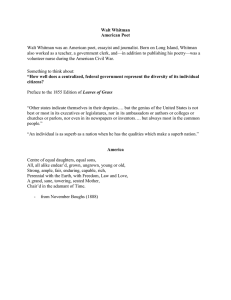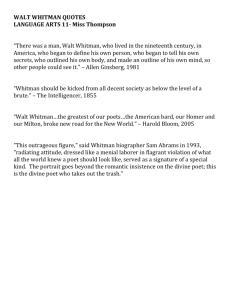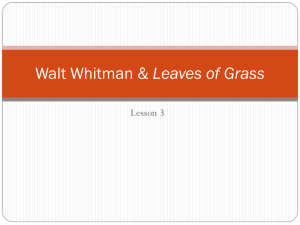
THE CONFIDENT VOICE incl. SHAKESPEARE TODAY Saturday 14th October 2023 Alan Watts Born 1915 Chislehurst England died 1973 California USA. English philosopher, writer, speaker, best known for his interpretation of Eastern philosophy for Western audiences. A Christian, he developed an interest in Buddhism at King’s School, Canterbury. Subsequently, a member of a Buddhist Lodge, scholars and spiritual masters, helped shape his ideas. A prolific writer he began writing at the age of fourteen. At twenty- three, migrated to the USA, where he received training under a Zen master, studied Christian scriptures; a Priest at Chicago for six years before leaving for San Francisco giving talks on Eastern philosophy Alan developed a wide audience home and abroad. Self-styled: ‘Philosophical Entertainer’, author of more than 25 books, he left an audio library of nearly 400 talks, still in great demand. “Civilisation, the achievements of art and science, technology and industry, is the result of man’s invention and manipulation of symbols — words, letters, numbers, formulas and concepts, and such social institutions as universally accepted clocks and rulers; scales and timetables, schedules and laws. By these means, we attempt to measure, predict, and control the behaviour of the human and natural worlds — to such startling apparent success that the trick goes to our heads. All too easily, we confuse this world with the world as it really is. 1 | Page Money a way of measuring wealth is not wealth itself. A chest of gold coins or a fat wallet of bills is of no use whatsoever to a wrecked sailor alone on a raft. He needs wealth in the form of a fishing rod, compass, an outboard motor with fuel, and - a female companion. This ingrained archaic confusion of money with wealth is the main reason we cannot produce food, clothing, housing, and utilities for everyone. Man discovered the Fahrenheit scale of temperature, the avoirdupois measure of weight. The national debt — we go into debt, as individuals and nations, because we confuse money with wealth, the worst outcome by far of which, is War! If we changed from the gold standard to a wealth standard, prices might stay more or less where they are at the time of change and — miraculously — everyone might discover that he and she have more than enough to wear, eat, drink, be merry, and survive with affluence and happiness - in our time”. Drawing from ‘How People Earn and Use Money,’ 1968. 2 | Page “It’s a mere one hundred years since the industrial revolution. As it was very difficult to persuade people then that the earth is round and in orbit around the sun, or the universe exists in a curved space-time continuum, it may be just as hard to get it through to our ‘common sense’ that the ‘virtue’ of making and saving money are obsolete. There are limits to the wealth that any individual can consume — we can’t drive four cars at once, live simultaneously in six homes, take three tours at the same time, or devour twelve roasts of beef at one meal. The moral challenge we face today is that a life of real affluence requires considerable discipline and - some imagination. Drawing ‘How People Earn and Use Money,’ 1968. It could open up many opportunities for our frustrated craftsman, painters, sculptors, poets, composers, yachtsman, explorers, potters to earn a living in a different more satisfying way “. 3 | Page So it might also encourage a plethora of bad and indifferent results from ‘unleashed amateurs’, but a general long-term effect could be real quality and variety of fine art, music, food, furniture, clothing, gardens, and even - homes. Here’s the nub of the problem. We can’t proceed with full productive technology today if we poison the elements, destroy wildlife and sicken the bloodstream with antibiotics and insecticides; its main object to make money”. Drawing from ‘How People Earn and Use Money’ (1968) 4 | Page What’s required is both simple and difficult: Our financiers, bankers, and stockholders must turn themselves into real people; ask exactly what they want out of life — which might lead to a far more satisfying style of living than the one they now pursue. Quite simply come to their senses — and their own personal profit and pleasure. We are all living organisms rather than personalities or characters in a play or a novel, acting out some artificial plot in which people are masks for conflict. Man as an organism, to the world outside is like a whirlpool to a river: man and world a single natural process. Not invaders and plunderers in foreign territory. 5 | Page Our body is a magnificent dancing pattern of energy that simply does not happen by itself. It happens in concert with myriads of other patterns — animals, plants, insects, bacteria, minerals, liquids, and gases. You say: “I came into this world.” You didn’t! You came out of it as a branch from a tree. Perhaps the greatest illusion of the ego is that it can do anything to bring about radical improvement either in itself or in the world. Physically impossible as trying to lift yourself off the floor by your own bootstraps. Furthermore, the Ego, like Money is a concept, a symbol, certainly a delusion — not a biological process or physical Reality”. 6 | Page WALT WHITMAN One of America's most influential poets, Walt Whitman aimed to transcend traditional epics avoided the normal aesthetic form and mirror the potential freedoms to be found in America. In 1855, he self-published the collection Leaves of Grass; the book now a landmark in American literature, though at the time of its publication considered highly controversial. Known as the "Bard of Democracy" he was recognised as one of America's most influential poets, Whitman's own love for America and its democracy echoed with his parents, who showed their admiration for their country by naming Whitman's younger brothers after their American heroes. George Washington Whitman, Thomas Jefferson Whitman and Andrew Jackson Whitman. Driven by politics they contrasted sharply with their son's preference for a more optimistic course in life he, more in line with his mother's disposition. "I stand for the sunny point of view. Yet even as Whitman felt new appreciation, the America he saw emerge from the Civil War disappointed him. His health, too, continued to deteriorate. Right up until the end, he'd continued to work with Leaves of Grass, which during his lifetime had gone through many editions and expanded into some 300 poems. Whitman's final book, ‘Good-Bye, My Fancy’ was published the year before his death “The land and sea, the animals, fishes, and birds, the sky of heaven and the orbs, the forests, mountains, and rivers, are not small themes; but folks expect the Poet to indicate more than the beauty and dignity which they always attach to dumb objects; they expect him or her to show the path between reality and their soul. This is what you shall do: 7 | Page “Love the earth and sun and the animals, despise riches, give alms to everyone that asks, stand up for the stupid and crazy, devote your income and labour to others, hate tyrants, have patience and indulgence toward people. Take off your hat to the known or unknown or to any man or number of men; go freely with powerful uneducated persons and with the young ------ with the mothers of families. Read the leaves in the open air every season of every year of your life. Re-examine all you have been told at school or church or in any book, dismiss whatever insults your own soul. Your very flesh shall be a great poem and have the richest fluency not only in its words but in the silent lines of lips and face, between the lashes of your eyes and in every joint and motion of your body”. “The known universe has but one complete lover and that is -the Poet”. He or she aspires, consumes an eternal passion; indifferent to what chance happens to bring or which contingency of fortune or misfortune challenge their daily and hourly ‘monetary receipts’. What baulks or breaks others is a fuel for their burning progress to every touch and joy Without effort, without showing how it is done, our Poet brings you the spirit of event, passion, scene and person (some more, some least) to bear on your very own individual character as you read and hear. To do this well is to compete with the laws that pursue and follow Time”. 8 | Page The proof of a poet is that his country absorbs him as affectionately as he has absorbed it”. 9 | Page O O For a Muse of Fire, that would ascend The brightest Heauen of Inuention: A Kingdome for a Stage, Princes to Act, And Monarchs to behold the swelling Scene. Then should the Warlike Harry, like himselfe, Assume the Port of Mars , and at his heeles (Leasht in, like Hounds) should Famine, Sword, and Fire Crouch for employment. But pardon, Gentles all: The flat vnraysed Spirits, that hath dar'd, On this vnworthy Scaffold, to bring forth So great an Obiect Can this Cock-Pit holdThe vastie fields of France? 10 | P a g e Or may we cramme Within this Woodden O. the very Caskes That did affright the Ayre at Agincourt? O pardon: since a crooked Figure may Attest in little place a Million, And let vs, Cyphers to this great Accompt, On your imaginarie Forces worke. Suppose within the Girdle of these Walls Are now confin'd two mightie Monarchies ,Whose high, vp-reared, and abutting Fronts, The perillous narrow Ocean parts asunder. Peece out our imperfections with your thoughts: Into a thousand parts diuide one Man, And make imaginarie Puissance .Thinke when we talke of Horses, that you see them Printing their prowd Hoofes i'th' receiuing Earth: For 'tis your thoughts that now must deck our Kings, Carry them here and there: Iumping o're Times; Turning th'accomplishment of many yeeres Into an Howre-glasse : for the which supplie Admit me Chorus to this Historie; Who Prologue-like, your humble patience pray, Gently to heare, kindly to iudge our Play. Exit 11 | P a g e


